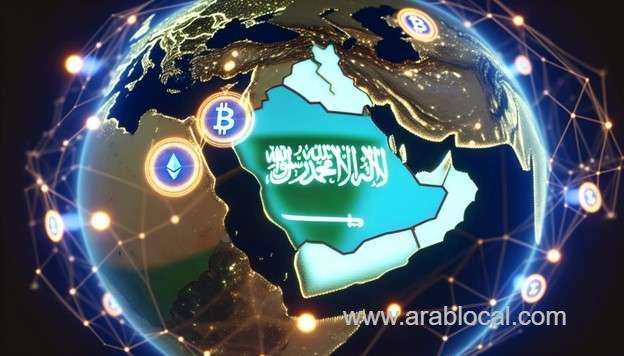How Cryptocurrencies Are Reshaping Saudi Arabia's Foreign Policy and Regional Relations
Just as the discovery of oil once shifted the geopolitical landscape of the Middle East, today, you're witnessing a new transformation as cryptocurrencies begin to influence Saudi Arabia's foreign policy and regional relations. You might wonder how a digital phenomenon could impact the intricate web of diplomacy and power in such a traditional region. By integrating blockchain technology, Saudi Arabia isn't just diversifying its economy—it's also crafting new alliances and redefining its role on the world stage. This strategic shift raises critical questions about the future balance of power in the Gulf. What could this mean for regional stability and global economic structures?
Cryptocurrency Adoption in Saudi Arabia
Exploring cryptocurrency adoption in Saudi Arabia reveals a nuanced approach to integrating digital assets within its financial landscape. As you investigate deeper, you'll find that the Saudi government's strategy isn't merely about embracing innovation haphazardly, but rather about cautious engagement with these technologies.
The Saudi Central Bank (SAMA) has been pivotal in shaping the regulatory framework. You're looking at a scenario where, rather than outright bans or unrestricted acceptance, they've opted for controlled pilot projects. For instance, the Aber Project, a collaborative effort with the UAE, tests the waters for a shared digital currency for cross-border transactions.
This approach reflects a broader strategy of reducing reliance on cash and improving digital infrastructure while maintaining stringent oversight. You'll notice that while private cryptocurrency trading isn't officially sanctioned, the development of a regulatory environment suggests a future where such activities might be more openly accepted.
This careful, methodical rollout serves dual purposes: it mitigates potential financial risks associated with digital currencies and aligns with Vision 2030's goals of economic diversification.
Understanding this landscape, it's clear that Saudi Arabia is setting a deliberate pace, ensuring that its financial system remains robust amidst global digital transformations.
Impact on Saudi-US Relations
Saudi Arabia's cautious adoption of cryptocurrencies could potentially reshape its diplomatic and economic relations with the United States. As you consider this shift, it's essential to recognize that the U.S. has been a key player in the global financial system. Any significant move by Saudi Arabia towards cryptocurrencies could influence the dynamics of this longstanding partnership.
Cryptocurrencies offer a means for Saudi Arabia to diversify its economy beyond oil, aligning with its Vision 2030 goals. This diversification could reduce its economic dependency on the U.S. dollar and, by extension, its financial reliance on U.S. economic policies.
Moreover, the integration of blockchain technologies and cryptocurrencies in Saudi Arabia's financial system could lead to enhanced financial transparency and efficiency. This development might align with U.S. interests in promoting a stable and transparent global financial system. However, it also poses challenges, such as potential complications in tracking financial transactions for regulatory and security purposes, which are vital concerns for the U.S.
You should also be aware that as Saudi Arabia explores these new financial technologies, the U.S. might need to recalibrate its financial, technological, and diplomatic strategies to maintain its influence not only in Saudi Arabia but across the Middle East. This evolving scenario requires careful navigation to preserve mutual interests in regional stability and economic cooperation.
Influence on GCC Dynamics
As you consider the broader implications, it's evident that Saudi Arabia's engagement with cryptocurrencies could considerably alter its interactions within the Gulf Cooperation Council (GCC). The move towards digital assets positions Saudi Arabia as a potential leader in financial technology within the region, which could shift the balance of economic power among the GCC countries.
Saudi Arabia's proactive approach in integrating cryptocurrency into its financial system may influence other GCC members to develop or expedite their own digital currency initiatives. This could result in a race to establish technological supremacy, fostering a competitive yet collaborative environment. The dynamics of cooperation and competition among these nations might be recalibrated as each country assesses its strategies for economic diversification and technological advancement.
Moreover, Saudi Arabia's cryptocurrency policies might serve as a benchmark for regulatory frameworks within the GCC, encouraging a more harmonized approach to digital currencies. This could enhance financial cooperation across the council, leading to more synchronized economic policies and possibly a unified digital financial market.
However, disparities in technological adoption and regulatory landscapes could also highlight or widen existing fissures within the GCC, impacting overall unity and collaboration.
Digital Currency and Trade Policies
Delving into the domain of digital currencies, it's vital to examine how Saudi Arabia's trade policies are being reshaped by its adoption of these technologies. As you explore this landscape, you'll find that the kingdom is strategically leveraging cryptocurrency to enhance its trade operations, aiming to streamline transactions and reduce costs.
The introduction of a digital riyal could potentially revolutionize trade within the region by facilitating faster, more secure cross-border transactions. You'll notice that this shift not only simplifies the process but also greatly diminishes the dependency on conventional banking systems. Keeping an eye on the Bitcoin trading price can provide valuable insights into market trends that may influence these transactions. This reduction in transaction time and cost is particularly important in strengthening Saudi Arabia's trade relations, making it a more attractive partner globally.
Moreover, the integration of blockchain technology into trade policies aids in enhancing transparency and accountability. You'll see that this technology provides an immutable record of transactions, reducing the risk of fraud and corruption, which are perennial concerns in international trade.
Cryptocurrencies in Geopolitical Strategies
Cryptocurrencies are reshaping Saudi Arabia's geopolitical strategies, offering new avenues for exerting influence and negotiating power on the international stage. You're witnessing a strategic pivot where Saudi Arabia leverages digital currencies not just for economic benefits but as tools in broader geopolitical maneuvers. This shift suggests a nuanced approach to how the kingdom perceives its place in a digitally evolving world.
Through cryptocurrencies, Saudi Arabia can potentially bypass traditional financial systems which are heavily influenced by Western powers. This autonomy enhances its diplomatic leverage, especially in dealing with countries facing Western sanctions or financial exclusion. It's a way for the kingdom to strengthen ties with these nations, providing them with an alternative economic lifeline while securing political alliances and support for regional initiatives.
Moreover, the adoption of blockchain technology in Saudi's policy frameworks introduces a layer of transparency and security in transactions, appealing to foreign investors and states concerned with financial integrity. This technological embrace positions Saudi Arabia as a forward-thinking leader in the Middle East, capable of bridging the gap between modern financial technologies and traditional economic practices.
You're seeing a strategic layer added to Saudi's foreign policy toolkit, where cryptocurrencies aren't just economic tools, but also instruments of geopolitical influence.
Future Trends in Regional Diplomacy
Looking ahead, you'll find that Saudi Arabia's engagement with cryptocurrency is likely to redefine regional diplomacy, fostering new alliances and reconfiguring existing power dynamics.
As you navigate this evolving landscape, you'll see Riyadh leveraging digital currencies to cement its position as a financial hub, not just in the Gulf but across the wider Middle East and North Africa region.
You'll observe a shift where Saudi Arabia, traditionally reliant on oil, starts using crypto initiatives to project economic modernity and innovation. This move won't just attract investments; it'll also create a platform for Saudi Arabia to influence the formulation of global crypto regulations.
As you consider these developments, you'll recognize their potential to form new economic partnerships, particularly with countries that are also embracing blockchain and fintech advancements.
Moreover, you'll understand that these technological ties could lead to a softening of political tensions. By focusing on shared economic interests, Saudi Arabia and its neighbors might find common ground, reducing the historical geopolitical frictions.
As you watch this space, it'll be evident that the kingdom's crypto diplomacy could well be a game-changer in how regional alliances and rivalries are traditionally understood and navigated.
Conclusion
As you embrace cryptocurrencies, you're not just diversifying your economy; you're reshaping your foreign policy and regional relations.
By steering away from oil dependency and leveraging digital currencies, you strengthen ties within the GCC, alter dynamics with the U.S., and position yourself as a pivotal geopolitical player.
Looking ahead, your commitment to blockchain innovation will likely continue to transform trade policies and diplomatic strategies, ensuring your prominence in a rapidly evolving technological landscape.









